Apple’s CEO Tim Cook has recently met with White House officials and representatives of big tech companies in the United States, including Google and Microsoft, to discuss counterterrorism and methods of blocking tech spying attempts.
According to a report, Cook was the most vocal when talking about backdoors, criticizing the White House administration for not standing against backdoors and for actually supporting programs that would in the end lead to spying on users.
Apple in general, and Tim Cook in particular, has always been against user snooping programs, including those in the United States and the United Kingdom, clearly explaining that turning to backdoors would hurt law-abiding citizens.
Apple depending on unhackable solutions
Talking about unhackable products, such as the iPhone encryption system and services bundled into it, including iMessage, Tim Cook previously said that Apple wants to offer customers the secure products they would expect to find, without creating breaches that would eventually impact everyone.
“If there’s a way to get in, then somebody will find the way in. There have been people that suggest that we should have a backdoor. But the reality is if you put a backdoor in, that backdoor’s for everybody, for good guys and bad guys,” he pointed out in a recent 60 Minutes episode.
At the White House meeting, however, Cook’s statements were quickly countered by none other than Attorney General Loretta Lynch, who explained that the US and tech companies must find a way to reach the balance between privacy and national security. Whether this would mean turning to backdoors in products sold in the US still remains to be seen, but Tim Cook reiterated that he is strongly against it.
FBI Director James Comey defended the use of backdoors in products sold in the United States, saying that the government wouldn’t necessarily spy on users, but would only provide a backup way to get access to these devices should their owner be a suspect of terrorism.

 14 DAY TRIAL //
14 DAY TRIAL //